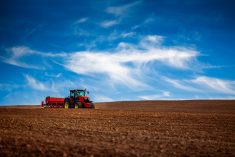I’ve said it before, but it remains true. The big thing non-farmers don’t understand about farming is that so much of it hinges on decision-making.
It’s one of the constants in agriculture.Farmers wrestle with more tough decisions in a year than many of their city cousins face in their entire careers, and not just because of the financial scale involved, although it can’t be completely overlooked that a mid-power tractor today can cost more than the average house.
The challenge is that there’s no clear way to evaluate which decision is best.
Read Also

Building a farm legacy that outlasts you
A farm’s legacy isn’t just about the land; it’s also about the values and the impact that continue long after the current owner has stepped away.
Now, it looks like 2013 is going to be even worse, despite current crop prices.
Few Canadians will face choices this winter as tough as a farmer trying to decide whether to match the ludicrous bid that the guy down the road has just made for the land you’ve always rented, or whether to say it’s just too scary and give the land up, even though you’ve sized your machinery with that land in mind.
Nor will they spend sleepless nights wondering whether to size up the farm so the kids can come back home, even though land has been on a record run.
And of course, that’s without even mentioning whether now is the right time to pull the trigger on some sales, or whether to hang on so you don’t miss out on the next shot of bad weather news from almost anywhere on the globe that sends prices shooting still higher.
The experts aren’t a lot of help. Either you can go to your lender, where you’ll be told that global population growth means you’re virtually guaranteed a profit on any money you want to borrow. Or you can go to the market experts, who warn that current prices are way, way above what we should pencil in for coming years, as David Drozd tells Country Guide associate editor Gord Gilmour for his piece this month called Break The Cycle.
The lesson of the past couple generations is that over the long term, commodity prices tend to hover at just under the cash cost of production for the average-cost producer. Either that’s because prices are low, and inputs are low too, or because prices are high and inputs are high as well, including the inputs that farmers are in charge of, such as land rental and purchase prices.
In this way, experience is the third “expert” opinion. But is experience still valid, or are we in a whole new world, where the twin demons of global climate change and global population growth mean that agriculture will fall short of demand more often than it can meet it?
To be honest, I don’t know, and I know you don’t know either. But it’s helpful to recall what our parents used to say. Most bad decisions get made in good times. At the very least, a proverb like that has the merit of being based on human nature, the one thing that isn’t going to change.
Are we getting it right? Let me know what you think. You can reach me at [email protected], or phone me at 519-674-1449.















